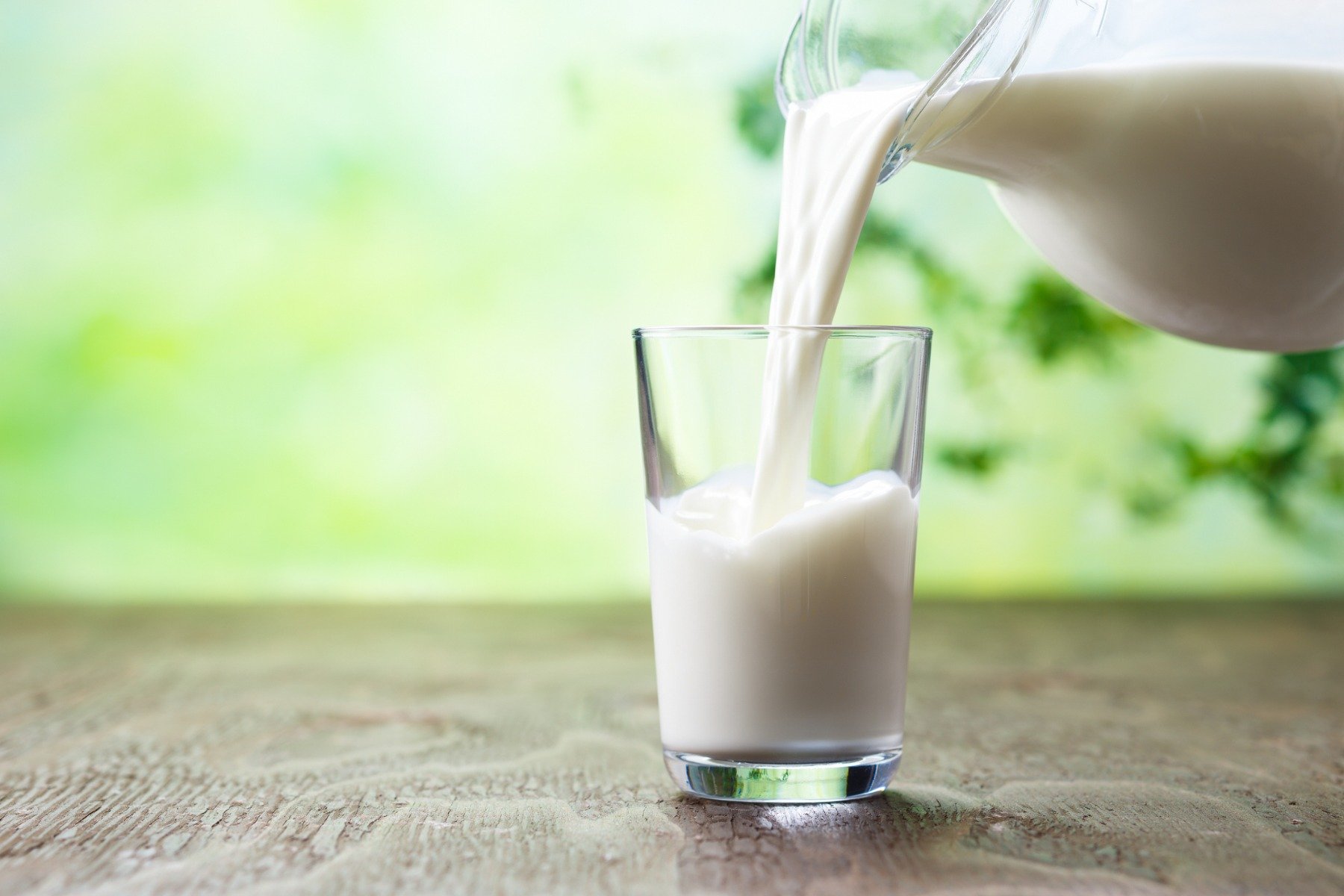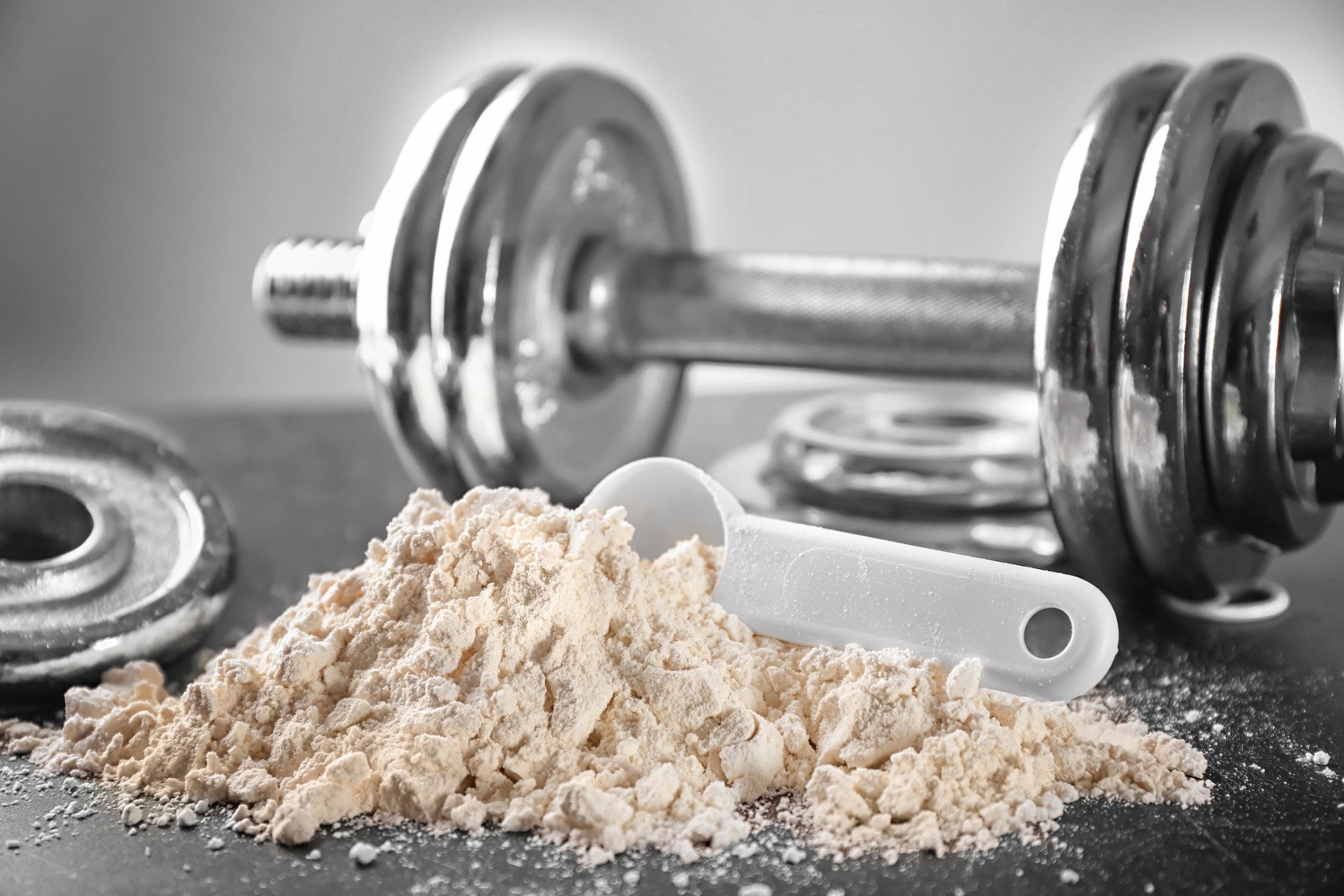Table of Contents
What is Casein?
Casein is a protein that is extracted from whey from mammalian milk. Most people consume casein in the form of cow’s milk. It is a solid insoluble part of milk, which accounts for about 80% of milk proteins. Whey is the soluble part of the milk and the remaining 20%. [1]
Casein is also an integral part of cheese production. It has the ability to change its consistency to the gel form and therefore functions as a binder. In the digestion process, casein turns into gel from after contact with gastric acid. This reduces the rate of casein digestion and allows slower, more stable, and more efficient amino acid release. Slow digestion rate is also beneficial because it increases satiety. [2]

There are two forms of casein [3]:
- micellar casein – the most popular and slowly soluble form of casein that is usually produced by the microfiltration process
- hydrolysed casein – a form of pre-treated casein that is absorbed more rapidly
Casein, like all proteins, is a quality source of amino acids. Because it is an animal source, it offers a complex amino acid profile and thus contains all the essential amino acids that the human body cannot create itself. As far as the composition of casein protein is concerned, as a rule, 33 grams of powder contains 24 grams of protein, 3 grams of carbohydrates and 1 gram of fat. The casein protein may also contain micronutrients such as calcium and phosphorus, but the resulting casein composition usually depends on the manufacturer. [1] [15]

The casein protein also contains various bioactive peptides that have many health beneficial effects. The process of digestion of the peptides partially takes place in the stomach. Even before the peptides are cleaved to substantial amino acids, they act in the intestine. Thanks to this process, casein has a number of positive effects, which we will discuss below. [1]
You might be interested in these products:
Advantages and properties of Casein
1. Promotes muscle maintainance
If you are trying to reduce fat, you are most likely to hold a caloric deficit. The greater the deficit, the faster fat loss you can expect (up to some point). The disadvantage of a large calorie deficit is that you may actually lose too much of muscle mass. But attention, we mean a healthy and balanced caloric deficit, no radical diets that cause many other physiological and psychological disorders and are not a suitable nutritional strategy for weight reduction.
However, even a sensible limitation of calories can lead to some loss of muscle mass because your body will not receive the necessary energy during the day. Thus, your body can use body tissues to replenish its energy supply. At best, your hungry body will start consuming fat, in the worst case, the muscles. However, in keeping with the caloric deficit, it is usually a combination of both, and it is therefore important to limit this effect. [4] [16]
Studies have confirmed that increased protein intake can prevent muscle loss in short-term use of the caloric deficit. For example, one study tested the effect of proteins on overall fat loss and muscle mass growth. Subjects tested received either hydrolysed casein or hydrolysed whey protein while consuming fewer calories and undergoing resistance training. In both groups, the experts noted loss of fat, but the casein group showed increased fat loss and increased strength in the chest, arms and legs. [4] [16] [17]

In addition, researchers found that individuals who consumed casein protein achieved a higher percentage of muscle mass compared to the second group of subjects. This also suggests a higher degree of muscle mass conservation when using casein. Of course, it is important to remember the important fact that both groups received up to 1.5 g of protein per kilogram of body weight per day. Consequently, it is essential to increase protein intake in a caloric deficit. [17]
The survey of 2013 also suggests that consuming twice as much protein as recommended leads to the protection of fat-free mass during short-term eating in the form of caloric deficit. [16]
2. May increase satiety
You might already know that casein is gradually absorbed in the body, and therefore scientists have decided to investigate its impact on the feeling of a full stomach. Satiety is particularly desirable for the reduction program because it is less likely that you want to eat. Therefore, many studies have compared casein protein powder with whey and other types of protein, but they vary in results.
One study compared casein, pea protein, whey, and egg albumin. The results indicate that casein and pea protein can saturate more than the remaining two protein sources. [22]

However, a study of 2014 found that whey protein causes stronger feeling of full stomach than casein. [23] Thus, studies have not come to uniform conclusions as to why casein or whey are more saturating compared to other proteins. As we know, casein is more slowly absorbed and therefore it is assumed that it could theoretically bring the feel of satiation. However, whey may cause a different hormonal response. Another study explains that different protein sources can stimulate different hormones that affect appetite. Today, however, science is not sure which proteins affect these hormones. [24] [25]
3. Can improve body composition
Since casein can maintain muscle mass at the time of caloric deficit and theoretically can increase satiety, it is no surprise that it can improve body composition. Studies confirm that carbohydrate reduction and increased protein intake can significantly enhance body shape. [19]
Indeed, a protein-containing diet may slightly increase thermogenesis, satiety, and consequently weight loss. Both whey and casein protein. have been shown to be effective in this case. A 2013 study showed that milk proteins in general can improve metabolic health and reduce body fat. [20] [21]

4. Promotes colon health
A study by Australian experts explored the health benefits of various proteins for colon health. Researchers have found that milk proteins support colon function better than meat or soy. This is another reason why you should consider casein as a suitable protein supplement to your diet. [18]
Advantages of casein vs whey
The biggest difference between casein protein and whey protein is their absorption time. While whey is a rapidly absorbable protein, casein is mainly known as a slowly digestible protein that is part of the nocturnal proteins. [1]
Casein is released gradually over time and absorbed in the intestine. This means that your cells feed amino acids for a longer time than whey. The advantage of casein for athletes is that it helps to synthesize the protein even when the body normally cleaves its own muscles. As a result, we label casein as an anti-catabolic protein that also helps reduce muscle breakdown. [6] [7] [8]

One study tested the rate of casein and whey digestion on the groups of participants. Experts have monitored blood amino acid content, in particular, the key amino acid leucine, for 7 hours. They found that leucine levels increased by 25% in the whey protein consuming group, indicating faster digestion of whey. Conversely, the casein-receiving group reduced the total amount of protein burned over 7 hours. This has improved protein balance, which is a key factor in the growth and maintenance of muscle mass. [9] [10]
However, the slow release of amino acids following the use of casein tends to reduce the maximum anabolic response of the organism. This means that casein may not stimulate protein synthesis of muscle proteins as strongly or rapidly as whey protein. In addition, casein contains less leucine (8%) compared to whey protein (11%). As we know, leucine is the most important of the BCAA amino acids because it stimulates protein synthesis and hence muscle growth. [2]
How to maximize the effects of casein?
If you continue reading, you are definitely thinking about which protein is more suitable for you – whey protein or casein. We encourage you to make the most of benefits of both and thus combine whey protein with casein.
As mentioned above, whey will provide you with the maximum anabolic response and casein will feed your muscles with amino acids for a long time. Therefore, if you want to make the influence of proteins more effective, consider receiving casein with a rapidly absorbable whey protein. This way you can benefit from a high dose of leucine and a stable flow of amino acids. Alternatively, try to combine casein with BCAA or leucine itself which will provide you with similar benefits. [2]
Is casein a night protein?
Most people consume casein in the evening before bedtime. It is logical because this way, the body can receive the necessary nutrients during sleep. However, if we look at the studies, we come to the conclusion that it is not necessary to accept casein exclusively at bedtime.
One study examined a dose of 40 g casein half an hour before bedtime on recreational athletes. The results confirm that after training, athletes regenerated their muscles during their sleep. At the same time, their protein synthesis increased by 22%, compared to a group of athletes who took a placebo at bedtime.
However, the drawback of this study is the fact that the casein-receiving group consumed 1.76 g of protein per kg of weight. In contrast, the placebo group received only 1.2 g protein per kilogram weight. Thus, the study essentially compared a higher daily dose of protein versus a lack of protein at athletes, rather than importance of casein at bedtime. Thus, based on this study, we cannot say what role casein has played as a nocturnal protein. [14]
This was also repeated in another study that looked at the effects of casein in a group of young athletes. These people received 27.5 g of casein and 15 g of carbohydrates just before bedtime for a period of three months, three times a week. The second group of athletes used placebo. At the same time, both groups were exercising three times a week. Research has come to the conclusion that the first group has achieved a higher increase in muscle fibres, which is in favour of casein. Unfortunately, the first group received more protein in total than it was in the placebo group again. Against this background, we are unable to assess whether time is a decisive factor in casein consumption. [5]
Concluded from above, overall protein intake and not time is the most important. But that does not mean that you cannot use casein before going to bed. It is the other way round. It is important that you keep the necessary amount of protein from high-quality sources and this is what casein definitely is.
Therefore, if you are taking a protein drink before or after training, choose a fast protein source found in whey protein or hydrolysed casein. A micellar casein is suitable for protein supplementation in the morning, between meals or in the evening before going to bed. [2]
You can also provide casein intake by food i.e. milk and dairy products such as natural yoghurt, curd or cheese. [2]
Daily dose of casein
With optimal casein dosing, it is important to consider your total daily protein intake from both supplements and diet. In fact, protein targets vary from person to person, especially according to your fitness goal. In general, however, the following dosage applies [1]:
- If you are an athlete or a physically active person and are attempting to reduce body fat while maintaining muscle mass, your daily protein intake should be 1.5 – 2.2 g per kilogram of body weight
- if you are an athlete, a physically active person, or trying to reduce fat while maintaining muscle mass, your daily protein intake should be 1.0 – 1.5 g per kilogram of body weight
- if you are a sedentary type, do not exercise or try to change your body composition, you should receive 0.8 g per kilogram of body weight
If you want to supplement the casein with protein, your daily dose should not exceed the above values (taking into account both protein intake and diet and other sources). If you are able to take the necessary amount of protein through the diet, then you do not need to replenish the casein. However, a different rule applies to athletes, since their daily protein intake often exceeds the protein they take from diet. [1]
Side effects of casein
The myth that high protein intake causes bad health has been refuted many times. Direct studies and research have shown that there are no negative effects in healthy individuals. The only exceptions are patients with concurrent kidney or liver disease who should reassess the amount of protein taken after discussing with a doctor. [11] [12] [13]
However, some people may be allergic to casein or have lactose intolerance, which is found in small amounts in casein nutritional supplements. Casein can also cause digestive problems such as inflating and flatulence, but it depends on the individual. [3]
Like whey protein, casein is a safe product that can benefit overall health in long-term use. We believe that we have offered you information about casein you did not know and that you can choose the right one based on this article the next time you buy proteins.
Write us what type of protein you consume, whether casein, whey, or a combination of them. If you liked the article, don’t hesitate to support it by sharing it.


Add a comment